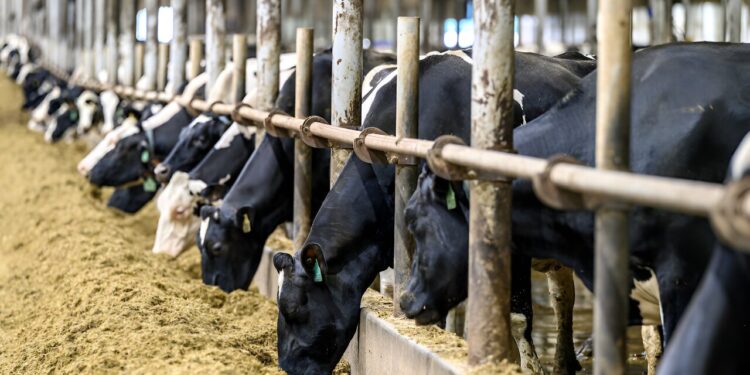A new technique could help farmers extract useful nutrients such as ammonia and potassium from livestock manure to efficiently make fertilizers and other useful chemicals. Credit: Althéa Dotzour
An interdisciplinary team led by University of Wisconsin-Madison scientists has developed a new technique that could help farmers extract useful nutrients such as ammonia and potassium from livestock manure to efficiently make fertilizer and other useful chemicals.
Although the strategy has yet to be extended beyond the proof-of-concept stage, the group’s preliminary analyzes show it could provide significant benefits by reducing water and air pollution while simultaneously creating products that farmers could use or sell.
Manure stinks in part because it contains ammonia, one of more than 300 compounds that contribute to its odor. The acrid gas is not only a harmful air pollutant, it can also transform into nitrogen oxide, a greenhouse gas, and nitrate, polluting water.
Ammonia is also the basis of many nitrogen fertilizers that have fueled modern agricultural production. The industrial method of making ammonia for nitrogen fertilizers, the Haber-Bosch process, consumes a lot of energy and emits hundreds of millions of tons of greenhouse gases each year.
Although manure itself can be used as fertilizer, this can be expensive, logistically difficult, and have environmental drawbacks. So, researchers around the world are looking for strategies to efficiently recover ammonia from manure, creating more concentrated and valuable fertilizers that are more environmentally friendly and more affordable to transport.
Among these strategies are chemical processes powered by electricity, which is becoming increasingly cheap in many rural communities thanks to the growing production of solar and wind power. However, most of the electrochemical techniques under development are not yet practical, mainly because they are energy intensive and are not efficient enough to extract dissolved ammonia (in the form of ammonium ions) from manure.
This new technique, described in a December 8 article published in the journal Sustainability of naturerelies on a specially designed electrode, like those used for batteries, that targets ammonium ions.
The technique involves a nickel-based electrode placed directly into manure wastewater. As the organic matter present in the manure is naturally oxidized by the electrode, ammonium ions as well as potassium ions contained in the wastewater are selectively entrained and captured by the electrode.
The strategy is about more than just removing nutrients from wastewater.
In an innovative step that could help make the process even more attractive, the nutrient-charged electrode is then placed in a device that uses electricity to release the recovered ammonium and potassium ions, which can then be used to make fertilizers based on nitrogen and potassium. , and simultaneously produce other useful chemicals. These could include hydrogen or hydrogen peroxide, which is commonly used for disinfection.
“We were lucky because nature does a lot of the work for us,” says UW-Madison chemistry professor Song Jin, who led the work with doctoral student Rui Wang and Professor of civil and environmental engineering Mohan Qin.
“The manure contains all of this and we don’t need to do too much extra work,” says Jin. “The battery material goes in and the ammonia is sucked out as the organic material is oxidized.”
Tests with small quantities of manure recovered more than half of the ammonia in the first pass, with approximately 85% recovery after two cycles.
The ability to produce fertilizer and other chemicals together is a key part of why the team thinks its strategy could be a winner. An environmental analysis led by Nelson Institute of Environmental Studies professor Rebecca Larson says a 1,000-head dairy farm could reduce its ammonia emissions by more than 50 per cent by deploying the system, while reducing considerably the amount of nitrate. entering neighboring waters.
Meanwhile, a preliminary techno-economic analysis conducted by Massachusetts Institute of Technology collaborator Professor Fikile Brushett shows that a model dairy farm using the system could expect the resulting revenues to exceed the costs of exploitation, provided that electricity prices are not exorbitant. .
Next steps include improving materials and processes, scaling the system, and studying how it operates at a level that more closely resembles an actual livestock operation. Jin is optimistic that the benefits of the system will continue to outweigh the potential costs at these larger scales, given initial analyses.
“This indeed looks promising,” says Qin. “There is a way to see how this could really help in the real world.”
More information:
Rui Wang et al, Electrochemical recovery of ammonia and co-production of chemicals from manure wastewater, Sustainability of nature (2023). DOI: 10.1038/s41893-023-01252-z
Provided by University of Wisconsin-Madison
Quote: Zapping manure with special electrode promises effective method for producing fertilizers and other chemicals (2023, December 11) retrieved December 12, 2023 from
This document is subject to copyright. Apart from fair use for private study or research purposes, no part may be reproduced without written permission. The content is provided for information only.



